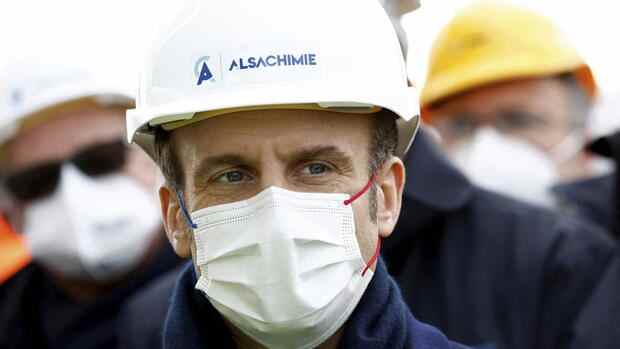Paris The French employers’ association Medef is getting impatient. The first round of the presidential elections will take place in the neighboring country in twelve weeks, but issues that are important to companies have so far played no role in the political debate. “The presidential election should be the moment to talk about the economic programs of the candidates,” said association boss Geoffroy Roux de Bézieux on Monday. “You have to realize that’s almost not the case.”
The second largest economy in the European Union is facing major challenges. In the pandemic, national debt has risen to a record high. There is a great need for investment, especially with regard to the climate-friendly restructuring of the economy. Important structural reforms, such as the pension system, have also been left undone under President Emmanuel Macron.
Finally, hopes in France that the increase in inflation was only a temporary phenomenon have been dashed. Employers warn of the consequences for the purchasing power of the population and the government’s debt service. “Interest rates will rise,” said Roux de Bézieux. “The painless days of public debt are over.”
There is definitely a substantive basis for the debate: the candidates stand for more or less clearly formulated positions in economic and financial policy. Their programs differ significantly in some cases. But the issues in the election campaign are different: the French are having emotional discussions about how to deal with the unvaccinated, the fight against crime, migration and questions of national identity.
Top jobs of the day
Find the best jobs now and
be notified by email.
The Cercle des Économistes, an association of influential French economists, is missing a political debate about the future economic direction of the country less than three months before the election. “This must move to the center of the debates that have so far revolved around questions of the pandemic, internal security and immigration,” demanded Jean-Hervé Lorenzi, who founded the Circle of Economic Experts in the early 1990s.
Member Patrice Geoffron, Professor of Economics at the University of Paris Dauphine, was also “amazed by the absence” of economic issues.
A stronger focus on the economy would suit Macron, who has been trying to tout his record in this area for months. The President hardly misses an opportunity to explain to the citizens that he has guided the country well through the corona crisis. France was in the top European group in 2021 with growth of more than six percent. Unemployment is falling.
The second largest economy in the European Union is facing enormous challenges.
(Photo: imago images/Westend61)
Macron also attributes the increase in investments by foreign companies to his policies, such as making labor law more flexible and reducing taxes on companies and on capital income. At the beginning of January, Finance Minister Bruno Le Maire hinted at an event with entrepreneurs that Macron and his center-alliance plan further tax breaks for industry if re-elected.
Officially, the President has not yet declared that he is seeking a second term. But there is no doubt about it. In autumn he presented a kind of “Agenda 2030” for France and promised “massive investments in our innovation and industrial strategy”. In the next five years, 30 billion euros are to flow primarily into the green and digital transformation of the economy.
In Macron’s view, the return to greater fiscal discipline will have to wait. During the pandemic, French national debt rose to around 115 percent of gross domestic product. In absolute terms, France’s debt is 2.8 trillion euros, almost a quarter of the total in the euro zone.
Macron is “burning down the state treasury” – this is the accusation made by the middle-class conservative Republican candidate, Valérie Pécresse. She wants to reduce the national debt to 100 percent of GDP by 2027, among other things by cutting ten percent of jobs in public administration. One of the key points of Pécresse is also to raise the general retirement age from 62 to 65 years. Like Macron, she promises further tax cuts for companies, but also a lower tax burden on inheritances.
Right-wing populist Le Pen courts socially disadvantaged groups
Right-wing populist Marine Le Pen is trying to win over voters with lower incomes in particular. Their purchasing power should improve, for example, through lower consumption taxes on energy and petrol. Le Pen wants to reintroduce the wealth tax abolished under Macron. For the right-wing populist, one of the biggest weaknesses in her defeat by Macron five years ago was her economic credibility. She has cleared radical positions such as France leaving the euro.
The battle for the Élysée Palace in April is likely to be decided between Macron, Pécresse and Le Pen. The incumbent is clearly ahead in the polls for the first ballot with around 25 percent. Pécresse and Le Pen are fighting for second place in the runoff with 16 to 17 percent each. Pollsters also see Macron as a favorite in the second round, but it could be tight for the president in a duel with Pécresse.
Meanwhile, the left camp is fragmented, and none of the candidates are given a serious chance of winning the runoff or even the Élysée Palace. The Socialist candidate, Anne Hidalgo, tried to go on the offensive with a €50 billion package. She promised investments in the social sector and a 15 percent increase in the minimum wage. But the former People’s Party is bobbing in polls at two to three percent.
The Banque de France warns that there is not much scope for distribution. French central bank chief François Villeroy de Galhau called on candidates to be careful with tax cuts or spending increases. “The reality is that our country doesn’t have the resources for either,” he said. “The debt situation should worry us.”
More: Europe’s leading power – how Macron’s France is fundamentally changing the EU
